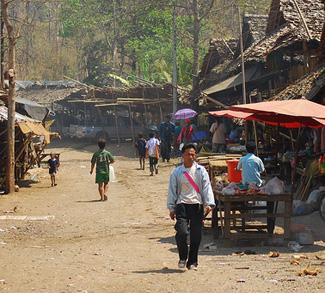Summary
Chinese authorities are keeping a watchful eye on Tibet, wary of a repeat of last year’s demonstrations and riots. The recently initiated “Strike Hard” campaign adds to the pool of evidence that Beijing has no interest in engaging with the Dalai Lama to reach a negotiated solution to the Tibet problem.
Analysis
Various reports coming out of Tibet point to a marked increase of military presence in the region. PLAsoldiers have been dispatched to the monastery town of Xiahe, where they are patrolling the streets by day and rounding up monks for questioning by night. Chinese soldiers have also been spotted in various monasteries standing ready to respond to any unrest. Snipers have been reported on the roofs of major temples.
The current Strike Hard campaign has already resulted in the detainment of over 50 people on charges ranging from prostitution and drugs to having ‘reactionary’ music on a mobile phone. This campaign is in keeping with China’s recent Defense White Paper that identifies Tibetan, Uighur, and Taiwanese separatism as major threats to Chinese security.
Although the stated aim is to round up criminals, the campaign serves as a warning to the Tibetan population that the Chinese military is close at hand should there be a repeat of last year’s demonstrations.
Political dissidence, both real and prospective, will likely be dealt with harshly as this year is particularly sensitive for the CCP. March 10th will mark the 50th anniversary of the abortive 1959 Tibetan uprising, an event that resulted in the Dalai Lama’s flight over the Himalayas. June 4th will be the 20th anniversary of the violent conclusion to the Tiananmen Square protests. On top of these sensitive dates, CCP cadres will also be keeping a wary eye on the worsening economic situation in China, particularly the growing ranks of the 20 million newly unemployed migrant workers returning from the coastal areas to their home provinces.
Chinese government statements on Tibet continue to place blame on the Dalai Lama. The official policy line is that Beijing has provided the Tibetan people with a wealth of opportunities for economic development; however, there remains an unruly element in Tibetan society solely due to the external, pro-independence meddling of the Dalai Lama. This policy ignores the fact that the Dalai Lama has decided to drop his demand for Tibetan independence and adopt a ‘middle way’ goal of cultural and political autonomy for Tibet within the Chinese state. Beijing seems to have given up any pretense of a negotiated solution, instead looking to the future in an attempt to circumvent a similar situation involving the Dalai Lama’s successor.
Tibetan Buddhists have historically used a series of omens and signs to locate the re-incarnated form of the Dalai Lama. While this selection process represents a challenge for CCP control, Beijing’s past intervention in the selection of the Panchen Lama forms a precedent that points to probable involvement in the selection of the next Dalai Lama.
In 1995, the Dalai Lama’s candidate for the re-incarnation of the Panchen Lama was swiftly challenged by a different CCP appointment. The Dalai Lama’s candidate and his family subsequently disappeared and have not been seen since.
This scenario presents a dilemma for the Dalai Lama. The diplomatic track is not bearing fruit and time is running out. Moreover, he has no control over the process of selecting his successor because the search doesn’t begin until the Dalai Lama dies.
The Chinese government has decided on a course of waiting out the 75-year old spiritual leader in the hope that the independence movement dies with him. By steering the appointment of the Dalai Lama’s successor towards a pro-Beijing candidate, the Chinese government can ensure that there are no organized sources of Tibetan resistance to Chinese rule. Given this ultimate goal, the short-term security situation in Tibet will continue to be characterized by ‘striking hard’ and intimidating defiant elements of the population into docility.
Zachary Fillingham is a contributor to Geopoliticalmonitor.com



